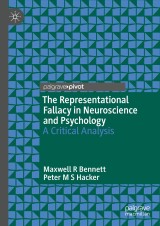Details
The Representational Fallacy in Neuroscience and Psychology
A Critical Analysis|
37,44 € |
|
| Verlag: | Palgrave Macmillan |
| Format: | |
| Veröffentl.: | 24.08.2024 |
| ISBN/EAN: | 9783031575594 |
| Sprache: | englisch |
| Anzahl Seiten: | 82 |
Dieses eBook enthält ein Wasserzeichen.
Beschreibungen
<p>This book traces the history and coherence of the use of the word ‘representations’ from its origins, particularly in the description of artefacts, to its use in the description of so-called mental and neural representations in the mind and in the brain. It is shown that there are no good reasons for this transition. Experimental psychology is confused in taking what one perceives to be a mental representation. Neuroscientists need to avoid moving readily between the notions of neural and mental representations; indeed even the logic of taking a pattern of neural activity as <em>standing for</em> some sensibly experienced characteristic requires elucidation. It is concluded that the word ‘representation’ when used in experimental psychology and cognitive neuroscience is confounding.</p>
1. The Varieties of Conceptions of Representation.- 2. The Early History of Representations in Experimental Psychology.- 3. The Early History of Neural Representations.
<p><strong>Maxwell R Bennett</strong> is Emeritus Professor of Neuroscience and held the first University Chair for ‘research recognized internationally to be of exceptional distinction’ at the University of Sydney. This research is on the biophysics and neurobiology of synapses. He is the author and co-author of over 300 papers as well as of thirteen books on the neuroscience, history and philosophy of this subject. In the last twenty years he founded <em>The Brain and Mind Research Institute</em>, as well as <em>The Mind & Neuroscience Thompson Institute</em>, each concerned with ameliorating mental illness. </p>
<p><strong>Peter Hacker</strong> is Emeritus Fellow of St John's College, Oxford and holds an Honorary Professorship at University College, London at the Institute of Neurology. He is a leading authority on the philosophy of Wittgenstein, has written extensively on philosophy and neuroscience, philosophy of language, philosophy of mind, and the philosophy of human nature. He is author and co-author of more than twenty-five books.</p>
<p><strong>Peter Hacker</strong> is Emeritus Fellow of St John's College, Oxford and holds an Honorary Professorship at University College, London at the Institute of Neurology. He is a leading authority on the philosophy of Wittgenstein, has written extensively on philosophy and neuroscience, philosophy of language, philosophy of mind, and the philosophy of human nature. He is author and co-author of more than twenty-five books.</p>
<p>This book traces the history and coherence of the use of the word ‘representations’ from its origins, particularly in the description of artefacts, to its use in the description of so-called mental and neural representations in the mind and in the brain. It is shown that there are no good reasons for this transition. Experimental psychology is confused in taking what one perceives to be a mental representation. Neuroscientists need to avoid moving readily between the notions of neural and mental representations; indeed even the logic of taking a pattern of neural activity as <em>standing for</em> some sensibly experienced characteristic requires elucidation. It is concluded that the word ‘representation’ when used in experimental psychology and cognitive neuroscience is confounding.</p>
<p> </p>
<p><strong>Maxwell R Bennett</strong> is Emeritus Professor of Neuroscience and held the first University Chair for ‘research recognized internationally to be of exceptional distinction’ at the University of Sydney. This research is on the biophysics and neurobiology of synapses. He is the author and c0-author of over 300 papers as well as of thirteen books on the neuroscience, history and philosophy of this subject. In the last twenty years he founded <em>The Brain and Mind Research Institute</em>, as well as <em>The Mind & Neuroscience Thompson Institute</em>, each concerned with ameliorating mental illness. </p>
<p><strong>Peter Hacker</strong> is Emeritus Fellow of St John's College, Oxford and holds an Honorary Professorship at University College, London at the Institute of Neurology. He is a leading authority on the philosophy of Wittgenstein, has written extensively on philosophy and neuroscience, philosophy of language, philosophy of mind, and the philosophy of human nature. He is author and co-author of more than twenty-five books.</p>
<p> </p>
<p><strong>Maxwell R Bennett</strong> is Emeritus Professor of Neuroscience and held the first University Chair for ‘research recognized internationally to be of exceptional distinction’ at the University of Sydney. This research is on the biophysics and neurobiology of synapses. He is the author and c0-author of over 300 papers as well as of thirteen books on the neuroscience, history and philosophy of this subject. In the last twenty years he founded <em>The Brain and Mind Research Institute</em>, as well as <em>The Mind & Neuroscience Thompson Institute</em>, each concerned with ameliorating mental illness. </p>
<p><strong>Peter Hacker</strong> is Emeritus Fellow of St John's College, Oxford and holds an Honorary Professorship at University College, London at the Institute of Neurology. He is a leading authority on the philosophy of Wittgenstein, has written extensively on philosophy and neuroscience, philosophy of language, philosophy of mind, and the philosophy of human nature. He is author and co-author of more than twenty-five books.</p>
This book traces the history and coherence of the use of the word ‘representations’ Contends that experimental psychology is confused in taking what one perceives to be a mental representation Examines the logic of taking a pattern of neural activity as standing for some sensibly experienced characteristic


















